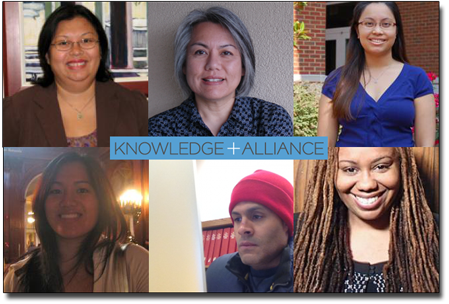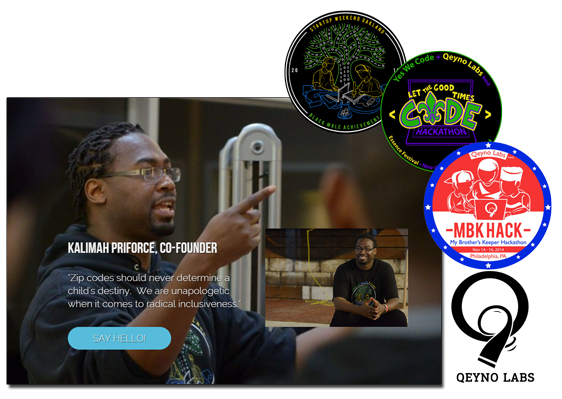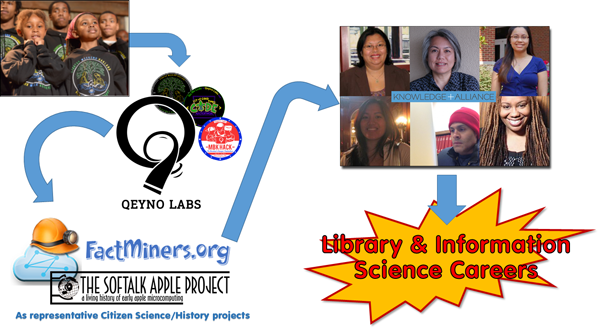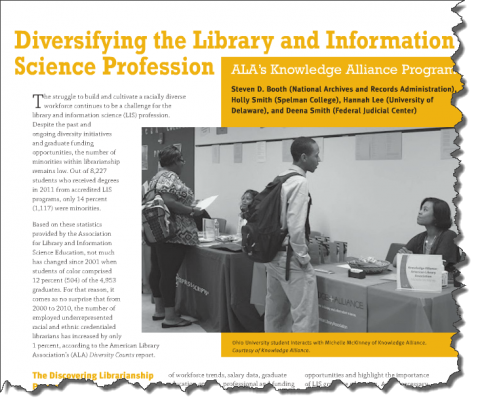This is an open letter of introduction to an amazing group of Knowledge Allies in the American Library Association (ALA) Knowledge Alliance Program. In particular, I am addressing the sub-group of Allies who have a stated interest in Digital Preservation; Melissa Cardenas-Dow, Patricia Hswe, Somaly Kim Wu, Sally Ma, Michael Elliott McWilliams, and Kai Alexis Smith.
I learned about the Knowledge Alliance Program in the current issue of 'Archival Outlook', the newsletter of the Society of American Archivists. The 'Diversifying the Library and Information Science Profession' article is a real 'call to arms' to all of us to do what we can to introduce talented minority STEM students to the opportunities and support available upon focusing on Library and Information Science (LIS) studies at undergraduate and graduate levels. (Click here for the beautiful full issue PDF and see page 10.)

As the article cites, in a study by the Association for Library and Information Science Education not much has changed since 2001 when students of color comprised 12 percent (504) of the 4,953 LIS graduates. From 2000 to 2010, the number of employed underrepresented racial and ethnic credentialed librarians has increased by only 1 percent, according to the ALA's Diversity Counts report.
The ALA's recognition of the importance of increasing diversity within the Library and Information Science (LIS) profession is more than commendable, it is essential. Because many of us know, "Librarian" is just the "Clark Kent" name for the Information Science Superheros that graduates of LIS programs will be in the emerging Linked Open and Big Data World of the 21st Century.
As talented minority STEM students recognize that their studies can lean toward the "Information Science" side of the LIS field of study, a whole range of creative passion-driven Life Opportunities emerge where, "Clark Kent, Librarian" might have seemed too-limiting a career aspiration.
From Hackathon Through Citizen Science/History to LIS Education
So having read this eye-opening article, I got to thinking about how FactMiners.org might collaborate with our #Play2Learn buddies to help bend that LIS enrollment curve upward.
At the moment, my wife and I have two projects in the semi-finals of the Ashoka/LEGO #Play2Learn Re-imagine Learning Challenge. FactMiners and The Softalk Apple Project are grassroots, independent Citizen Science/History projects. As entrants in this Challenge, we are involved in growing collaborations with fellow social entrepreneurs doing all kinds of amazing things in the Kindred Spirit of re-imagining what education needs to be in order to prepare, not just kids, but everyone for what it means to be an Empowered Individual in the 21st Century.

One social entrepreneur doing amazing work through his Qeyno Labs "Hackathon Incubator" is Kalimah Priforce. Kalimah has nurtured Qeyno Labs into an "opportunity-generating ecosystem" that brings together its own amazing bunch of people and all manner of partner organizations collaborating -- using their own description -- "to harness the interests of high potential youth from low-opportunity settings into STEM career pathways."
A hackathon is an in-person, mentored, intensive, learn-by-doing experience to teach interested kids how to code by building an app in a matter of a couple of days or a weekend. As I imagined the challenges that Kalimah's team must face, it became pretty clear that being the inspired start of a "STEM career pathway" implied further steps in follow-through from that inspiring start. These pathways would be composed of a series of "hand-offs" of mentored relationships that help an inspired Hackathon graduate reach his or her potential.
In some cases, the Hackathon-built app has its own "follow-through" power and creates the opportunity to build a business or developers' community around continued improvement of the app itself. But in many cases, the Hackathon will light a flame that needs to be fanned and its heat directed to the individual interests of the Hackathon graduate.
That's where Citizen Science/History projects and the Knowledge Alliance Allies come into play!

FactMiners and our associated Softalk Apple Project are already exploring a "mentored pair programming" collaboration as part of our mutual involvement in www.DIYPlanetWalk.com, a self-help experiment in "bundled crowdfunding" by a group of Kindred Spirits in the #Play2Learn Challenge. If we are successful in our Kickstarter campaign, we'll have a good pilot for creating a "first step hand-off" in what can then lead to that "STEM->LIS" interest-focusing pathway for inspired Hackathon grads. This would seem like a great "win-win-win" all around.
What we would like to propose to our Kindred Spirit Allies in the Knowledge Alliance program is that you work with us to create a good communication channel and "smooth hand-off" so that grassroots Citizen Science/History projects can become a valuable "feeder system" for directing high potential youth from low-opportunity settings into Library and Information Science careers.
Perhaps something as simple as a new page on the Knowledge Alliance website with a list of "registered/interested" Citizen Science/History projects that are available for both paid and volunteer internships or Open Source contract development projects. Through our initial collaboration, we could develop the processes and materials needed to allow easy expansion of this network of creative career-shaping collaboration.
Next Steps
@ALALibrary @librarycourtney - Turns out @KnowledgeAll is '.net' and not '.org' - This meant for your Allies :-) http://t.co/tCT2mBPxIx
— FactMiners.org (@FactMiners) October 24, 2014
I will tweet to bring this blog post to the attention of the Allies at the Knowledge Alliance. I will also create a new user account as someone "interested in exploring the library profession" on the KnowledgeAlliance.org website. Through whatever means of communication works first, I look forward to learning more about the Knowledge Alliance and how we might work together to bring some talented young people into the Library and Information Science profession. We would love nothing more than to help young minds see the Information Science Superheros so many of us mistake for "typical librarians."

